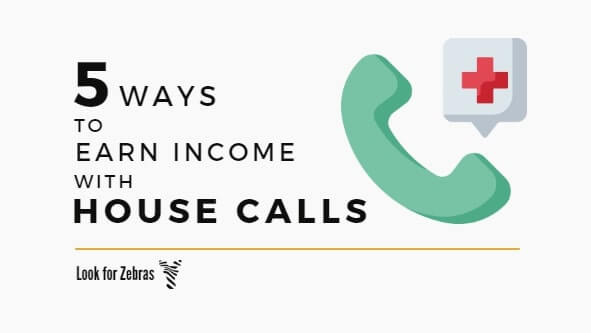Published by Lookforzebras
- 1. The Ubers of medical care
- 2. House call physician jobs for specialized populations
- 3. Supervise NPs for home assessment programs
- 4. Join a regional practice
- 5. Start your own
The other day I met a speech therapist at a party. To my surprise, she said she doesn’t work at a hospital or an outpatient center. She drives a company vehicle around our small city and surrounding counties, performing visits in patient’s homes, long-term care facilities, and rehab centers.
My interest was piqued. As she told me about her job, a handful of advantages to her work arrangement were clear:
- A lot of autonomy
- Rejuvenating breaks between visits while driving from site to site
- The frequent change of environment that prevents monotony
- Patients aren’t late or irritated by long a waiting room wait
- Easy to get a sense of the patient’s living environment and support system
Doctors making house calls isn’t a thing of the past. It has made an impressive, modernized return that benefits from technology, business innovation, and consumer demand for convenience.
As I found out from my new speech therapist acquaintance, there are opportunities for a variety of non-physician healthcare professionals, as well.
Here are five types of house call physician jobs that fit into the 21st century. They range from full-time employed positions to side gigs to business ownership opportunities.
1. The Ubers of medical care
The “sharing economy” is a term used to describe peer-to-peer based provision and sharing of services and goods, typically made possible through a mobile app or web platform. Popular companies of this type include Uber for ride-sharing, Airbnb for vacation rentals, and Rover for pet-sitting.
The sharing economy has reached medical encounters. Without a doubt, physicians and other medical professionals can benefit from app-based companies that match them up with nearby patients on a schedule that works for both parties.
Heal is the largest of this type of company to date. It allows consumers to schedule an appointment with a doctor using their website or an app. The doctor then shows up at their door with a medical assistant, ready to provide care.
Heal is currently available in several parts of California, the DC area, and Atlanta, and is growing.
I expect we’ll see some competitors in this space before long, as well as similar models that cater to specific medical specialties.
2. House call physician jobs for specialized populations
Not all house call physician jobs are primary care or urgent care for the general population. There are opportunities for house calls with specialized groups of patients or specific medical needs.
Some of these involve the traditional method of treating patients in their homes. Novel businesses, though, are now offering “house calls” in workplaces, hotels, and other non-traditional environments.
Skilled Wound Care focuses on providing physician-directed wound care services to patients in nursing homes. They send the doctor to the patient, omitting the need for costly, lengthy transportation. The company’s contracted physicians don’t need to be surgeons or wound care specialists, as training is provided.
Big industrial companies often have an employee health clinic onsite. However, not every company is large enough to warrant this. Smaller corporations sometimes contract with local occupational health clinics to offer medical services to their employees, but this can be inconvenient and costly.
Enter Employ Health, which sends medical practitioners to workplaces based on the client’s needs and schedules.
For travelers needing medical care while they’re away from home, Physician Room Service provides mobile doctor “house calls” in hotel rooms.
3. Supervise NPs for home assessment programs
Physicians who don’t have the time or desire to actually go out and do house calls themselves can still get involved in this field and earn income as a side gig.
Some health care payors and managed care providers offer home-based assessment services for their members. Details of these programs vary, though the ones I’ve seen aim to capture a plan member’s healthcare needs and health status without requiring them to present to a healthcare delivery setting. By identifying member needs, the company can take steps to get issues addressed in a timely manner – before they acutely deteriorate and require high-cost, emergent services.
This type of program tends to rely on nurse practitioners to do in-home patient assessments. Contracted physicians are compensated to collaborate with the NPs and perform chart reviews.
Examples include OptumCare HouseCalls and ComplexCare Solutions‘ assessment services.
4. Join a regional practice
Most multi-provider practices employing a house call model focus on a specific geographic area. For those interested in joining a house call practice serving your community, consider searching for a business in your local area.
Here are a few to get you started:
- MD at Home in the Chicago area
- Pediatric Housecalls in North Carolina
- Another one based in the Carolinas: Doctors Making Housecalls
- Maryland-based Doctors to You
- Premier Medical Housecall in Alabama
5. Start your own
You don’t need to sign up for an app or join an existing company to earn income from house calls. If you have the will, consider starting your own house call practice. In many ways, it can offer more flexibility than a brick and mortar practice.
You’ll need geography to target, a patient population, a business strategy, and a marketing plan. For examples of strong web-based marketing, check out the websites for the solo house call practices Nola Doc, HouseCall MD, and House Call Doctor Los Angeles.
Have you explored house call physician jobs or started your own house call practice? Let me know in the comments below.


I’ve been making housecalls for over a decade now as an employee. My employer is http://www.visitingphysicians.com.
They are the largest group in the nation. Surprised they weren’t mentioned in your article.